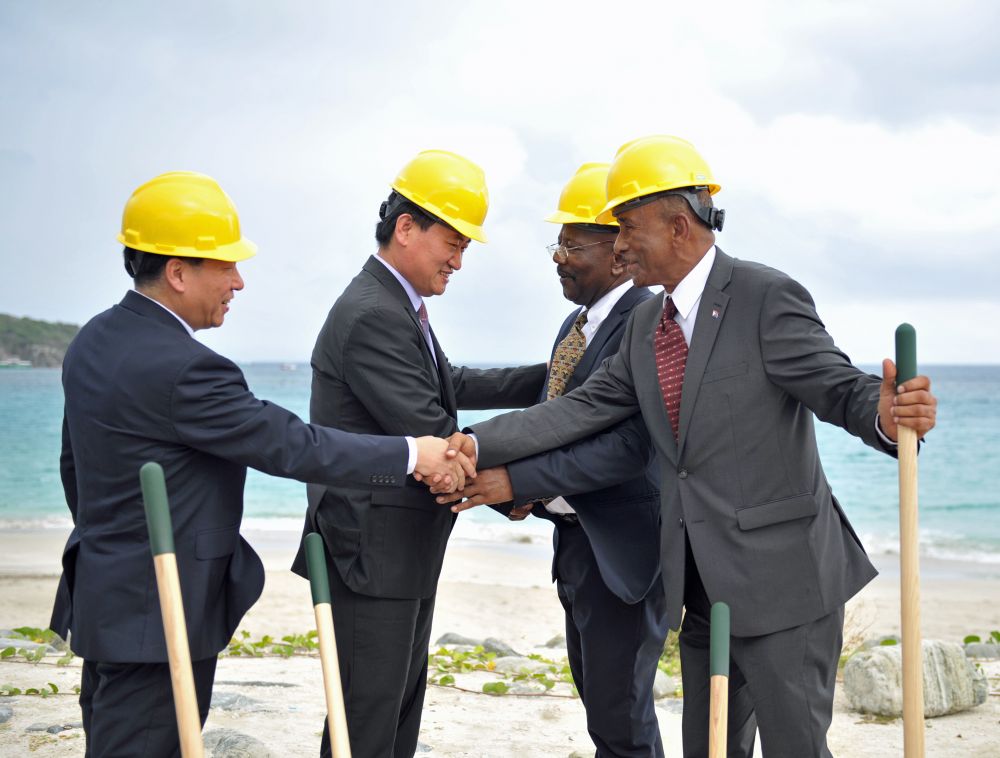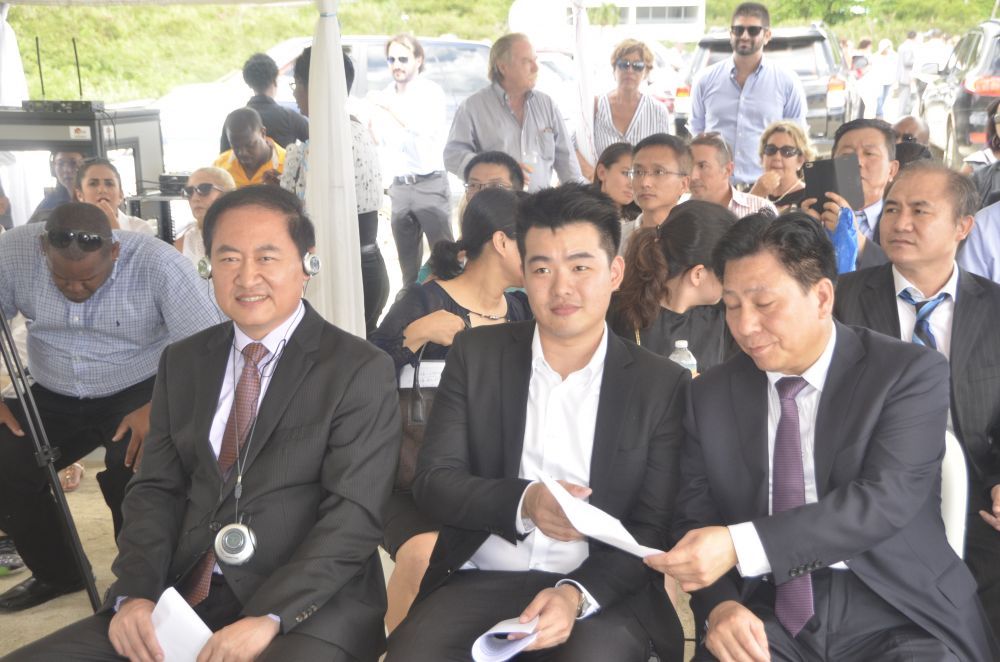Pearl of China: $120 million investment; 400 jobs “All jobs are for locals”
The text on the invitation for the events – The Pearl of Caribbean and China Global Trade Center – made already clear that the project is not tourism- but business-driven. Prime Minister William Marlin said that the developer – Universal Light Real Estate NV – bought the property in Little Bay, and that it also bought the building permit the previous owner held for the never realized Barbaron project. Under review is at the moment a variance, the developer has requested; once that has been processed nothing stands in the way of construction.
Construction is expected to begin in the first quarter of 2017; completion of the work will take two years.
Finance Minister Richard Gibson repeated at the press conference that fiscal facilities – like a tax holiday – had not been requested and had not been offered either.
The investment in the trade center is approximately $120 million, Cui said through a translator, adding that obtaining financing would not be a problem.
The protests ahead of the groundbreaking ceremony brought out startup politicians such as Wycliffe Smith (Christian party) and Mercedes van der Waals-Wyatt and Jacinto Mock (Hope), as well as St. Maarten Pride president Jadira Veen and Sjaoul Richardson of the youth empowerment movement Shoot Hoops Not Guns.
The protesters came with placards showing texts such as, ‘I am not afraid of the Chinese, I am afraid of my own politicians’ and ‘For Sale: ‘Friendly Island’ Reduced price!’ but their actions remained peaceful.
Prime Minister William Marlin described the protests later in the afternoon at the press conference as small. “We are not concerned about these protests,” he said.
“The response and the comments can be a driving force for us to make this project more successful,” a relaxed and smiling Shuqiang Cui said later at the press conference.
The Hanwang Caribbean Forum took place at the Great Bay Beach Hotel on Saturday morning. The Hanwang Forum stems from an international forum on sustainable development that was held at the Diaoyutai Guesthouse in Beijing in 2005. Seven years later, in 2012, the inaugural Hangwang Forum – an international conference on disaster prevention and relief and sustainable development was held in Beijing and Deyang. On Saturday, the forum spread its wings for the first time into the Caribbean.
Representatives of the Chinese delegation at the forum explained the philosophy behind the forum – and with it the philosophy behind the Pearl of China project.
The devastating May 12, 2008 Wenchuan Earthquake near the southwestern Chinese city of Dujianyang killed 90,000 people and wounded 375,000. It set the stage for the Hanwang Forum that focuses on climate change, disaster relief and sustainable development.
“We care about ecological values more than anyone else,” Shuqiang Cui said. “Everyone on our team holds the spirit of sustainable development; and we hope to bring this to St. Maarten.”
The Consul-General for China in Willemstad, Weixin Zhang, spoke about the new Silk Road – labeled One Belt One Road – and the way the Chinese do business. The original Silk Road was established thousands of years ago and was traveled by traders from China towards Europe – over land and over sea. “The country did not only trade silk, also ceramic and Chinese inventions,” the consul-general said. ”We also traded products from the countries along the route and had cultural exchanges. That way the cultures of east and west came together.”
The Silk Road, the consul-general continued, promoted the development of human civilization and it is a key heritage, not only for China, but for the world. It is promoting the philosophy of cooperation.”
China wants to cooperate and integrate with other countries, the consul-general emphasized. He spoke of ‘creating friendship and trust” and said that China works together with more than one hundred countries and non-governmental organizations and that on the industrial level there is cooperation with more than twenty countries.
The trade between China and the Netherlands is worth $70 billion. There are more than one thousand Dutch companies in China and more than 500 Chinese companies in the Netherlands, creating 8,600 jobs. We want to expand this philosophy of the new Silk Road,” the consul-general said, adding that he is pleased that the Pearl of China project is coming to St. Maarten. “This will also be a platform for entrepreneurs in the Caribbean. There are employment opportunities for St. Maarteners. This is a win-win cooperation.”
Prime Minister Marlin referred to the impact China will have on a small society like St. Maarten. “We are considered a strong link to carry out the vision of One Belt One Road.”
It is unfortunate, Marlin added, “that some make it appear as if this is about the construction of a hotel. This project will have a much further reaching impact on the economy. It will bring the world together, using St. Maarten as a hub.”
The project has “immeasurable potential” Marlin said, adding that more people begin to realize what it entails. “We are getting calls from people who want more information and they want to be part of this development. We understand that some people were taken aback because they thought that this is not for real, but the enormous benefits will become clear in the coming years.”
Cui assured the forum that he is not about to disappoint anyone and that this will become “the most successful project in St. Maarten.”
Yongjun He, described as a researcher for the People’s Daily – the official newspaper of the Chinese Communist Party – noted that this publication is “different from other newspapers.” He spoke about the desire to develop strong and mutually beneficial relationships between China, Latin-America and the Caribbean, the desire to expand trade of products with added value and the way these relationships should be maintained. “It is like a sprout that needs nourishing to grow into a large strong tree.”
Finance Minister Richard Gibson said in a brief address that the project “will change the landscape of St. Maarten forever – physically, but also financially. We will no longer have to worry about deficits, there will be surpluses on the budget,” he said. “This will lead to expansion of our economy, more dynamic and more business activity. I am extremely pleased with the philosophy with which Mr. Cui is approaching this project. It does not solely focus on profit; it is about increasing happiness and decreasing carbo-emissions. That is a refreshing new approach to development.”
Minister Gibson said that the One Belt One Road approach also offers opportunities to local entrepreneurs. And “to equip them with technology that was up to now not available to them. This will bring China and St. Maarten closer together and improve the happiness and wellbeing of the people.”
At the press conference in the afternoon language was an obvious topic. How will the Chinese work on cultural exchange and cooperation if all communication has to go through translators? Shuqiang Cui started his answer in a philosophical style.
“I hope everyone knows Chinese, it is a beautiful language,” he said. “Every single character of our language holds a lot of Chinese philosophy. We can send people to Chinese language courses; again, it is a beautiful language but not easy to learn. I hope that everyone will commit to learning Chinese for five years.”
Cui then put many minds a bit at ease: “Back to the project; the people responsible for it will speak English. Communication will be no problem.”
Asked how many of the 400 jobs he spoke about earlier are for locals, Cui said: “All jobs are for locals. And there will be more jobs coming.”
Cui said he is willing to work with local contracts “if they meet the quality standards.”
The People’s Daily Yongjun He remarked that the protesters in Little Bay “do not have enough understanding of China.”
Prime Minister Marlin said that it is unclear “whether there is a protest because of the elections of because of a lack of information. It is clear that there were not many protesters at all, so there is no reason for concern.”
On the flip side, Marlin said that many contractors have approached the government. “They all support the project. The focus is on creating jobs for locals and on preparing locals to be qualified for the jobs on offer. In the coming three months we will make an inventory to make sure that local contractors have the right equipment and technology to take part in a project of this magnitude.”







